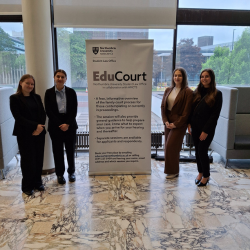-
Study
-
Quick Links
- Course Search
- Fees and Funding
- Unlock Your Potential
- Still time to Apply
- Higher and Degree Apprenticeships
- Continuing Professional Development
- Still time to apply
-
Undergraduate
- UCAS Clearing & Confirmation 2025
- Application Guides
- UCAS Exhibitions
- Foundation Years
- School & College Outreach
- Information for Parents
-
Postgraduate
- Application Guide
- Postgraduate Research Degrees
- Flexible Learning
- Change Direction
- Register your Interest
-
-
International
International
Northumbria’s global footprint touches every continent across the world, through our global partnerships across 17 institutions in 10 countries, to our 277,000 strong alumni community and 150 recruitment partners – we prepare our students for the challenges of tomorrow. Discover more about how to join Northumbria’s global family or our partnerships.
View our Global Footprint-
Quick Links
- Course Search
- Undergraduate Study
- Postgraduate Study
- Information for Parents
- London Campus
- Northumbria Pathway
- Cost of Living
- Sign up for Information
-
International Students
- Information for Students
- International Events
- Application Guide
- Entry Requirements and Education Country Agents
- Global Offices
- English Requirements
- English Language Centre
- International student support
- Cost of Living
-
International Fees and Funding
- International Undergraduate Fees
- International Undergraduate Funding
- International Masters Fees
- International Masters Funding
- International Postgraduate Research Fees
- International Postgraduate Research Funding
-
International Partners
- Agent and Representatives Network
- Global Partnerships
- Global Community
-
International Mobility
- Information for Northumbria Students
- Information for Incoming Exchange Students
-
-
Business
Business
The world is changing faster than ever before. The future is there to be won by organisations who find ways to turn today's possibilities into tomorrows competitive edge. In a connected world, collaboration can be the key to success.
More on our Business Services -
Research
Research
Northumbria is a research-rich, business-focused, professional university with a global reputation for academic quality. We conduct ground-breaking research that is responsive to the science & technology, health & well being, economic and social and arts & cultural needs for the communities
Discover more about our Research-
Quick Links
- Research Peaks of Excellence
- Academic Departments
- Research Staff
- Postgraduate Research Studentships
- Research Events
-
Research at Northumbria
- Interdisciplinary Research Themes
- Research Impact
- REF
- Partners and Collaborators
-
Support for Researchers
- Research and Innovation Services Staff
- Researcher Development and Training
- Research Ethics and Integrity
- University Library - Open Access
- Vice Chancellors Fellows
-
Research Degrees
- Postgraduate Research Overview
- Doctoral Training Partnerships and Centres
- Academic Departments
-
Research Culture
- Research Culture
- Research Culture Action Plan
- Concordats and Commitments
-
-
About Us
-
About Northumbria
- Our Strategy
- Our Staff
- Place and Partnerships
- Leadership & Governance
- Academic Departments
- University Services
- History of Northumbria
- Contact us
- Online Shop
-
-
Alumni
Alumni
Northumbria University is renowned for the calibre of its business-ready graduates. Our alumni network has over 246,000 graduates based in 178 countries worldwide in a range of sectors, our alumni are making a real impact on the world.
Our Alumni - Work For Us
What will I learn on this module?
The module aims to provide you with the knowledge and skills of applying a variety of Strategic Supply Chain Management (SSCM) knowledge at the subject interface to support business decision making in this area of subject. The module is delivered to you using weekly lectures and seminars, principally concentrating on the development of your subject skills and interpretation of the subject area.
Within this module, you will cover twelve main topics:
Logistics Planning Systems and Global SCM;
Customer Service;
Relationship Management;
Benchmarking the Supply Chain;
JIT and Quick Response Logistics;
Inventory Management;
Agile Supply Chain;
Lean Thinking;
e-Supply Chain;
from Purchasing to Procurement;
Reverse Logistics;
Quality SCM and Lean Six Sigma.
You will undertake various seminar and case study exercises to build the skills and expertise in these Strategic SCM areas to support your group and individual assignment work.
The module will lead you to the development of SSCM skills and confidence in handling the knowledge gained. In doing so, it will expose you to a wide range of subject techniques in the SSCM subject area. You will become aware of the role of the subject in the business context. Furthermore, you will gain an understanding of the role of the Supply Chain Manager and the development of various related business problem solving skills.
On completing the module you will be able to select and apply the appropriate SCM techniques to support business problem solving in a variety of situations. You will have developed relevant skills to support the theoretical material introduced throughout the module. You will create and design appropriate case study solutions as well as the use of a supporting theoretical underpin to SSCM problem solving.
How will I learn on this module?
The lectures will provide you with a theoretical underpinning of the module content, supported by a seminar which will give you an opportunity to practice the various techniques and topics studied, allowing you to build up a subject proficiency and the necessary skills of interpretation and communication of findings.
There will be a number of additional exercises housed on the module’s e-learning portal that will permit you to undertake further study independently. The module has a supporting reading list that provides you with an opportunity to see how the various decision making techniques are applied to further managerial and research-based problems.
Your directed study will support the work you have undertaken in the contact sessions. You will be expected to keep up-to-date with your lecture programme. In addition, you will be set a selection of exercises to complete in seminars. To aid with self-assessment on progress, solutions to these exercises will be made available to you on the e-learning portal where appropriate.
Independent learning time is set aside for learning activities, self-identified by you, to gain a deeper and broader knowledge of the subject. You may complete the review exercises, work with the electronic support tools (such as recordings of applications), or undertake further reading.
The problem solving nature of the seminars means that tutor (formative) feedback will be received continuously. Solutions to both seminars and directed learning activity on the e-learning portal will be aid knowledge and provide formative assessment.
How will I be supported academically on this module?
Support will be provided to you by a member of academic staff leading the module and providing the lecture input. A team of academic staff are allocated to small seminar groups, which provides a closer, more personal academic support. These groups are typically based on study programme cohorts, so you will be taught here alongside fellow members from your particular degree.
Your module is supported by an e-learning portal, which houses lecture materials, seminar exercises and data files, alongside assessment details and various support facilities, alongside other electronic support facilities such as indicated above.
You will be provided with a wide-ranging electronic reading list that comprises of various academic reports, conference papers and journal articles that showcase the application of various techniques presented in the module.
The module assessment consists of two main inter-related tasks which will be distributed throughout your teaching semester. This will encourage your active participation in the learning process throughout the semester. The eLearning portal will be used to permanently support these tasks after release to ensure that you can access the information required at all times.
What will I be expected to read on this module?
All modules at Northumbria include a range of reading materials that students are expected to engage with. Online reading lists (provided after enrolment) give you access to your reading material for your modules. The Library works in partnership with your module tutors to ensure you have access to the material that you need.
What will I be expected to achieve?
Knowledge & Understanding:
1. Critique and appraise a variety of Strategic Supply Chain Management techniques and their application to the analysis and interpretation of business data for a variety of organisational applications. (MLO1)
2. Understand and critically evaluate the role of Strategic Supply Chain Management as an aid to decision making; through the selection of techniques to assist in the solution of business problems. (MLO2)
Intellectual / Professional skills & abilities:
3. Evidence skills in the handling of Supply Chain Management techniques and the corresponding findings of its analysis and for progression to more advanced contexts. (MLO3)
Personal Values Attributes (Global / Cultural awareness, Ethics, Curiosity) (PVA):
How will I be assessed?
The module assessment consists of two inter-related tasks which will be distributed throughout your teaching semester.
This will encourage your active participation in the learning process throughout the semester via formative assessment.
The eLearning portal will be used to permanently host these tasks after release to ensure that you can access the information required at all times.
Your work on these tasks will provide you with further chance to practice the various areas of Strategic Supply Chain Management, as well as forming the pre-work for a group presentation at the end of the module.
This 20 minute presentation represents 20% of the module mark will be based on an investigation of an organisation identified by the group. An 80% individual assignment will allow you to individually use the presentation as a case study to further evaluate via secondary research the variation between Strategic Supply Chain Management practiced by the organisation an extensive literature review.
Both items of assessment address MLO1, MLO2 and MLO3.
Pre-requisite(s)
None
Co-requisite(s)
None
Module abstract
It is expected that you will enter employment with an appropriate level of Strategic Supply Chain Management (SSCM) understanding and proficiency in everyday business usage. This module provides these essential business skills giving you a theoretical understanding of various SSCM applications supported through practical Case Study exercises. You will work on a number of key techniques linked to which are set to practical scenarios, supporting work for practice and specific items relating to your assessment. You will undertake assessment tasks leading to an assessed presentation which places emphasis on your findings and problem interpretation. These critical, analytical, practical and interpretative skills are directly transferable to your working life, through part-time employment, placement or full-time graduate role. Your additional experiences within the module centre on support reading giving you additional awareness of the broad applicability of the module content across the wider business and management subject area.
Course info
Credits 20
Level of Study Undergraduate
Mode of Study 2 years Part Time
Location Hong Kong
City Hong Kong
Start September or February
All information is accurate at the time of sharing.
Full time Courses are primarily delivered via on-campus face to face learning but could include elements of online learning. Most courses run as planned and as promoted on our website and via our marketing materials, but if there are any substantial changes (as determined by the Competition and Markets Authority) to a course or there is the potential that course may be withdrawn, we will notify all affected applicants as soon as possible with advice and guidance regarding their options. It is also important to be aware that optional modules listed on course pages may be subject to change depending on uptake numbers each year.
Contact time is subject to increase or decrease in line with possible restrictions imposed by the government or the University in the interest of maintaining the health and safety and wellbeing of students, staff, and visitors if this is deemed necessary in future.
Useful Links
Find out about our distinctive approach at
www.northumbria.ac.uk/exp
Admissions Terms and Conditions
northumbria.ac.uk/terms
Fees and Funding
northumbria.ac.uk/fees
Admissions Policy
northumbria.ac.uk/adpolicy
Admissions Complaints Policy
northumbria.ac.uk/complaints









